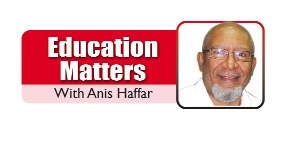My first call was to her engineer son, Mr Frederick Engmann, to verify the news of the passing of his mother, Mrs Comfort Engmann. She was everything to me: a loving mother figure, a prized colleague and an astute mentor.
When she retired finally, her house at La Bone, Accra, served as a Mecca of sorts for me. I would stop by often to give her photocopies of my Daily Graphic articles on education. She would ask that copies be made to update her teachers at the North Ridge Lyceum.
With the publication of my first book on leadership, she was one of the first to receive a signed copy. We sat downstairs near a bed she had fashioned for herself as she asked about the book, while flipping through the pages.
At the time, she was too frail to go up the stairs to the bedrooms; and having lost her husband, she had settled in the living room.
Before her demise, I had discussed with Fred and his sister, Carlien, the possibility of visiting the ailing educator to introduce my new book, “Strategies for Effective Teaching and Learning”, which she had inspired.
They both cautioned me to prepare emotionally for the visit, considering her existing condition where she did not recognise people much.
Star crossed meeting
I was first introduced to Auntie Comfort in 1995 by my mother-in-law, Mrs Felicia Agyeman — a renowned early childhood educator in her own right — when she sought admission for my two daughters: one for primary two and the other five.
What caught my eye at the time was a guiding quote by Henry Longfellow posted on the school’s bulletin board: “The heights by great men reached and kept were not attained by sudden flight, but they, while their companions slept, were toiling upward in the night.”
One afternoon, as I arrived to pick up the girls, Auntie Comfort and I got into our first conversation about my years of schooling and teaching in the US.
She was particularly intrigued by techniques I used to help students learn. It was a chat that was to groom my life for good. The chat was to propel me into tons of schools teaching and interacting with countless teachers, heads, parents and students across the length and breadth of this country.
Teacher education
Reflecting today — and taking an inventory of my work since her initial advice for me to focus on teacher education in Ghana — I recall working across schools from Accra to Wa, from Tamale to the Mamprusi area of Nalerigu.
From the western strip of the Shama District and Cape Coast to the eastern corridors of Nkwanta North and South bordering Togo. And then from Kumasi, Asankare and Koforidua to Afienya, Akosombo, Adumasa and counting …
Right from the beginning, she spurred me on without a blink in her thought. She was certain that I had something to offer schools in Ghana.
The resolve shaped an enduring vision in my spirit. Looking back, Auntie Comfort was as esteemed a stimulus as they come. I was lucky to have found such a model to emulate.
For that reason, I make it a sacred duty to ask students to find inspired and inspiring role models to spur them on in vocations of interest.
Once, a cautionary dressing down came uppermost in a conversation. It started off with this advice: “Your work in Ghana has been defined clearly in education.
Focus on teacher education; that’s what you are.” She then cautioned: “Resist temptations to join any politics. The day you enter politics, I don’t know you!” She was somber but clear in her admonition. She then named people she knew who had lost their way trailing politics.
Critical thinking
Auntie Comfort set me in motion to design a series of weekend workshops on her school grounds for “Critical Thinking”. She stressed its value to proprietors and heads in selected private schools in Accra.
At the time – about 1996 – Critical Thinking as an aspect of teaching practice was not in the Ghana Education Service (GES) syllabus. Initially, some resisted it as “non-sylla”, but she didn’t mind them.
She was quite prescient in recognising a good thing when she saw it. Engaged in the training sessions herself - and witnessing the interaction among the participants from the various schools - she dubbed the process “cross fertilisation”.
The methodology focused on a hierarchical order of cognitive precepts, scaffolded as: Knowledge, Understanding, Application, Analysis, Synthesis, and Evaluation.
[About four years later - in 2000 or so - the “Profile Dimensions” (another name for Critical Thinking) appeared finally in the GES syllabus.]
Lower to higher-level thinking
The idea was to reduce the “Lower level thinking” drudgery, that is, the repetitive question and answer method, memorisation of facts, the “chew, pour, pass, and forget” format - and thereby, avoid functional illiteracy.
The “Higher level thinking” order, however, demanded wholesome sets of activities to engage people to think for themselves to question other people’s conclusions for accuracy, analyse assumptions, to evaluate the validity in long held traditional beliefs, etc.
The courses presented me the honour of meeting leading women proprietors including Mrs Florence Laast (St Martin De Porres), Mrs Alberta Quartey (Alsyd Academy), Mrs Florence Adjepong (Alpha Beta Education Centre), Mrs Agnes Kwakye (Jack and Jill), Mrs Theresa Lomotey (Rect Academy), Mrs Abena Kwakyi (Morning Star) and others.
Auntie Comfort’s lifetime commitment to education cast refreshing glows on all the great women enamored with the purpose of raising children into successful adults. For an enduring legacy, she helped to establish and support the Foundation for Educational Research and Development (FERD) for private schools, chaired initially by Mr K.B. Asante of blessed memory.
The writer is a trainer of teachers, a leadership coach, a motivational speaker and quality education advocate.
E-mail: anishaffar@gmail.com

